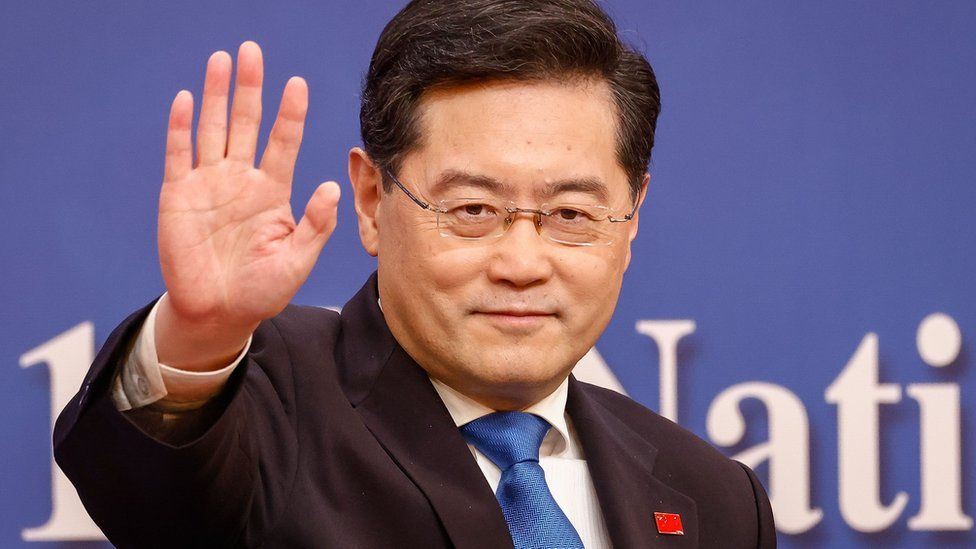The lengthy absence from public view of China’s Foreign Minister Qin Gang has sparked furious online speculation, while once again highlighting China’s secrecy.
The 57-year-old has not been seen in public for 23 days – his last reported engagements were on 25 June.
Appointed to his post last December, Mr Qin was seen as a trusted aide of Chinese President Xi Jinping.
As one of the best known faces of the Chinese government, Mr Qin’s prolonged absence has not only been scrutinised by diplomats and China watchers, but also ordinary Chinese people.
When asked about his whereabouts on Monday, Foreign Ministry spokesperson Mao Ning said she had no information to provide.
Under China’s largely opaque system, an abrupt disappearance of high-profile officials could be a sign of trouble. Ms Mao’s empty response led to a fresh spike in the already fevered speculation about Mr Qin’s absence and prompted deeper suspicion.
“Does she not know how to respond?” a user commented under a video clip of the spokesperson’s response on Weibo, China’s Twitter-like platform.
“The reply is quite worrisome,” another comment reads.
It is not uncommon for high-profile figures in China to disappear for long periods of time without much initial explanation, only to surface later as the subject of a criminal investigation. Or they can disappear and then reappear with no explanation for why they have been out of sight.
Xi Jinping himself vanished from view for a fortnight shortly before becoming China’s leader in 2012, prompting rumours about his health and possible power struggles in the Chinese Communist Party.
Mr Qin is one of the most high-level officials in the party to have been absent for this long.
Last week, the foreign ministry announced that he would not attend a diplomatic gathering in Indonesia citing citing health reasons, but that line was left out in the official transcript on the ministry’s website. Mr Qin’s predecessor, director of the Chinese Communist Party Central Committee Foreign Affairs Commission Office Wang Yi, went to the meeting instead.
Talks between the foreign minister and European Union foreign policy chief Josep Borrell were then also pushed back two weeks ago, as China informed the EU the dates were no longer possible, but with no explanation why.
The EU was informed of the postponement just two days before Mr Borrell’s scheduled arrival in Beijing, a source told Reuters.
On Monday, Mr Qin was once again missing from President Xi’s meeting with former Philippines President Rodrigo Duterte. Chinese state media’s footage showed Wang Yi and several other senior officials from the foreign ministry were present.
The information vacuum has only heightened the speculation.
In the past seven days, China’s biggest search engine Baidu has seen a drastic surge in searches for Mr Qin’s name. According to the Baidu Index, search for “Qin Gang” has grown by more than 5,000% in a week, and his name is being searched way more than some of the most famous Chinese celebrities.
One of the most widely shared theories online was that Mr Qin was being investigated over an alleged extramarital affair. When asked about the rumour on Monday, Ms Mao said: “I don’t know about the matter.”
Predictably, this did nothing at all to quieten the chatter.
“People are interested in the story because they are curious about any secrets in the black box,” says Wu Qiang, a Beijing-based China politics commentator.
“His disappearance has highlighted the fragility of China’s diplomacy system and high-level decision-making system.”
Although he’s been known as a tough-talking diplomat in the past, Mr Qin is regarded as having distanced himself from the “wolf warrior” style of diplomacy that China pursued in recent years.
His rise to become foreign minister was nothing short of meteoric. He is one of the youngest appointees to the post in the country’s history.
After less than two years in the role of ambassador to the US, he was named China’s foreign minister in December 2022.
Before that he’d been a foreign ministry spokesman and had helped organise Mr Xi’s trips overseas – which gave him the opportunity to work closely with China’s leader and, presumably, impress him.
Given the opacity of China’s system, it’s hard to tell whether Mr Qin is now really in trouble or if he could appear in front of the public again soon, says Ian Chong from the National University of Singapore.
But the fact that rumours about such a senior official are being discussed on the Chinese internet without complete censorship is quite unusual, he pointed out.
“The absence of censorship make people wonder if there is any truth to rumours about power struggles, corruption, the abuse of power and positions, and romantic relationships.”
Related Topics
- Asia
